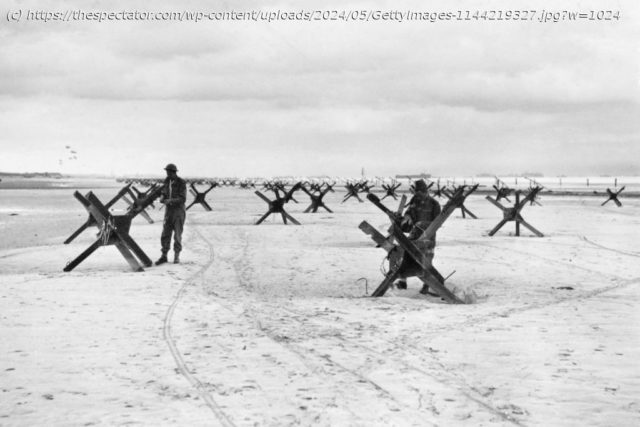This was a battle between the dark forces of tyranny and the forces of freedom. On this Memorial Day, it behooves us to hold fast to that
Last summer, I spent some time in and about Port-en-Bessin-Huppain in Normandy. The little fishing village and its surrounding towns on the English Channel (“La Manche,” “the sleeve” en français) is delightfully picturesque in that rugged, elemental way that proceeds from the collision of tempestuous sea and commanding headland.
Expansive fields of corn and other crops ripened fast, orderly in their serried, midsummer ranks. Orange-red poppies punctuated the grassy, flower-strewn verge and complicated the landscape, heavy with age and history. Poppies are for remembrance — and there’s a lot to remember in these parts.
Eighty years ago, in the opening minutes of June 6, 1944, the greatest amphibious assault in history began when a clutch of six gliders, navigating only by stopwatch, were cut loose over the Norman coastline and floated down upon the Bénouville Bridge over the Caen Canal and the Ranville Bridge over the Orne River less than a mile away.
The landing was picture-perfect. Today, three markers, mere yards from the Bénouville Bridge, commemorate the spot where the first gliders landed. Some 180 men disgorged from the silent airframes and quickly overpowered the German defenders of the two bridges, securing and holding the only crossings of the Orne north of Caen en route to the critical port of Cherbourg. Overlord, the Allied assault on Nazi-controlled Western Europe, had begun.
The capture of the bridges was a textbook coup-de-main operation, achieving its objective in a single blow. Two British soldiers were killed. I’ve read that the fate of the fifty German defenders is unknown. Later in 1944, the Bénouville Bridge was renamed Pegasus Bridge, after the depiction of Bellerophon riding Pegasus on the shoulder patch worn by members of the 6th Airborne Division of the British Army, which undertook the mission.
It was a quiet prelude to the cacophonous, multi-pronged assault that unfolded later that day — D-Day — as nearly 7,000 ships and some 4,500 aircraft suddenly appeared off the coast of northern France.






